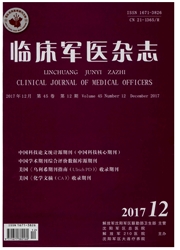

 中文摘要:
中文摘要:
目的探讨ST抬高型心肌梗死(STEMI)患者血浆中趋化因子CCL2水平与1年内发生主要心脑血管不良事件(MACCE)的相关性。方法选择2014年6月至2015年10月沈阳军区总医院冠心病监护病房收治的420例STEMI患者为研究对象。详细采集患者临床资料,采用酶联免疫吸附检测血浆中CCL2浓度。对患者进行1年的临床随访,终点为MACCE。确定入选患者血浆中CCL2的中位数浓度,并将患者分为A、B两组。利用Kaplan-Meier法比较随访1年时两组MACCE的发生率。利用Cox回归模型分析血浆中CCL2水平与患者1年内发生MACCE的相关性。结果发生MACCE(包括全因死亡、心衰、脑梗死、再发心梗)的患者,血浆中CCL2浓度明显高于未发生MACCE的患者。患者血浆中CCL2的中位数浓度为179.89 pg/ml,A组CCL2浓度≤179.89 pg/ml,B组CCL2浓度〉179.89 pg/ml。B组患者总的MACCE发生率及脑梗死的发生率明显高于A组(P〈0.05)。Kaplan-Meier分析及Cox回归分析显示,血浆中CCL2水平与患者1年内发生MACCE存在相关关系。结论血浆中CCL2水平与STEMI患者预后独立相关。
 英文摘要:
英文摘要:
Objective To investigate the association between the expression of chemokine CCL2 in plasma and major adverse cardiac and cerebral events(MACCE) in patients with ST elevation myocardial infarction (STEMI). Methods A total of 420 patients with STEMI were admitted from June 2014 to October 2015. The general data and clinical trial data were collected, plasma CCL2 concentra- tion was detected by ELISA with the venous blood. The patients were followed up for 1 year and the clinical end point was defined as MACCE. According to the median concentration of CCL2 in plasma of the patients, the patients were divided into Group A and Group B. Kaplan-Meier method was used to compare the incidence of MACCE in the two groups during 1 year of follow-up. Cox regression model was used to analyze the correlation between the plasma CCL2 concentration and MACCE. Results Plasma CCL2 concentration in patients with MACCE (including all-cause death, heart failure, stroke and recurrent myocardial infarction ) was significantly higher than that in patients without MACCE. The median concentration of CCL2 in plasma of the patients was 179. 89 pg/mi,in Group A was less than 179. 89 pg/ml and in Group B was more than 179. 89 pg/ml. The incidence of MACCE and cerebral infarction in Group B were significantly higher than those in Group A( P 〈 0. 05 ). Kaplan-Meier analysis and Cox regression analysis showed that the expres- sion of CCL2 in plasma was related to the occurrence of MACCE in patients during 1 year. Conclusion The expression of CCL2 in plasma was independently associated with the prognosis of STEMI patients.
 同期刊论文项目
同期刊论文项目
 同项目期刊论文
同项目期刊论文
 期刊信息
期刊信息
